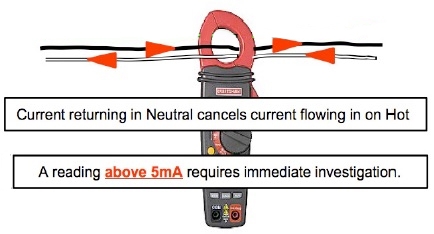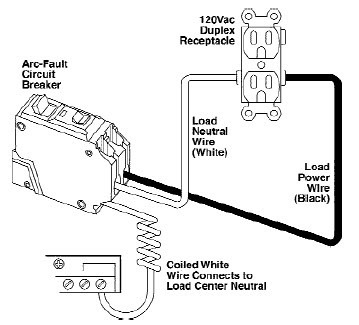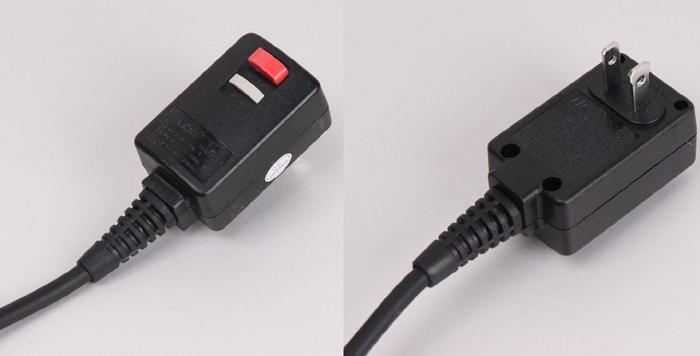 |
Matronics Email Lists
Web Forum Interface to the Matronics Email Lists
|
| View previous topic :: View next topic |
| Author |
Message |
nuckolls.bob(at)aeroelect
Guest
|
 Posted: Mon Sep 18, 2017 10:19 am Post subject: GFCI Breaker keeps tripping (Non Aviation) Posted: Mon Sep 18, 2017 10:19 am Post subject: GFCI Breaker keeps tripping (Non Aviation) |
 |
|
At 06:39 PM 9/17/2017, you wrote:
| Quote: | --> AeroElectric-List message posted by: Charlie England <ceengland7(at)gmail.com>
On 9/17/2017 4:20 AM, donjohnston wrote:
| Quote: | --> AeroElectric-List message posted by: "donjohnston" <don(at)velocity-xl.com>
|
|
<snip>
| Quote: | | Having said all that, if I were getting random GFI trips with nothing on the circuit, I'd be looking for 'issues' with both the ground wiring and the neutral wiring. I'd probably start with the neutral, making sure that its 'bond' to the ground in the panel is secure . . . |
Wiring issues downstream of the GFI are certainly at the
top of the list . . . and not hard to troubleshoot. A GFI
is a specialized incarnation of the clamp-on, AC ammeters
that are useful service tools. They let you measure current
in a wire by detecting the magnetic field outside the wire.
You can interpret current flow in the wire without having to
break into it.
The Hall Sensor devices common to DC current measurements
function on a similar principal. Hall devices can measure
both ac and dc currents, the familiar clamp-on service instruments
are transformers GENERALLY limited to AC measurements.
Measurements are made by running ONE wire in the supply
loop through the instrument's measurement aperture.
You could use such an instrument to detect wiring faults
by running BOTH supply loop wires thorough the aperture.
[img]cid:.0[/img]
During normal operation, the current flowing in the outbound
wire (hot) exactly equals the current on the return (neutral)
wire. Snapping the ammeter over a properly operating power
pair will show a net current reading of zero.
Now, assuming there is some leakage current from hot to
a remote ground, there will be an imbalance in the hot
vs. neutral conductors. If this current exceeds something
on the order of 5 MILLIAMPERES, the magnitude of leakage
is considered hazardous. Most service instruments are
not sensitive enough to detect/measure leakage currents
this small.
A ground fault breaker is simply an ac ammeter built
into the breaker housing. But in place of an observable
display, the transformer drives electronic circuitry
that (1) watches for imbalance in the hot/neutral
pair exceeding 5ma and (2) unlatching the breaker's
hold-closed mechanism when the leakage limit is exceeded.
The illustration above shows how the leakage is
monitored by passing both paths through the same
aperture. Making this happen in a GFI breaker
requires that both the hot and neutral wires pass
through the breaker.
[img]cid:.1[/img]
This illustration shows that instead of taking
the neutral wire right to the panel ground bus, it
goes to a terminal on the breaker. So not only
will this breaker have TWO terminals for house
wiring, a 'pigtail' routed the panel ground bus
completes the neutral path.
It's unlikely that nuisance tripping is caused
by loose connections. You have (1)a real leakage
problem out on the distribution wiring, (2)
a leaky appliance plugged into an outlet or
(3) a flaky GFI.
Do you have more than one GFI in the panel? If
so, try moving the hot/neutral pair on the problem
circuit over to another GFI. If the tripping moves
to the new breaker, then downstream leaking is
indicated. If the problem does not move, then
the breaker has a problem.
Similarly, a wall-receptacle GFI can be used as

a test tool. You can wire your 'problem feeder'
to the LOAD pair of terminals while using a pair
of jumpers from the LINE pair to the panel ground
and any handy breaker. See if the test GFI complains
about feeder quality.
Incidentally, a GFI does not need the safety
ground wire to function as intended. It measures
DIFFERENCE currents in the hot/neutral pair . . .
the leakage MIGHT be flowing back on the safety
ground wire . . . or to another current sink . . .
it doesn't matter.
Many appliances like hair dryers and pressure
washers have GFIs built right into the plug on
the end of the cord.
[img]cid:.2[/img]
Note that many end-of-cord GFIs don't feature a third prong
for safety ground . . . it's not needed to monitor and
react to an IMBALANCE of current flow on the hot/neutral
pair.
There are other experiments that you can use to explore
leakage on the problem feeder . . . but confirming
proper operation of the panel GFI is the first . . .
Bob . . .
| | - The Matronics AeroElectric-List Email Forum - | | | Use the List Feature Navigator to browse the many List utilities available such as the Email Subscriptions page, Archive Search & Download, 7-Day Browse, Chat, FAQ, Photoshare, and much more:
http://www.matronics.com/Navigator?AeroElectric-List |
|
| Description: |
|
| Filesize: |
49.33 KB |
| Viewed: |
4075 Time(s) |

|
| Description: |
|
| Filesize: |
51.83 KB |
| Viewed: |
4075 Time(s) |

|
| Description: |
|
| Filesize: |
108.14 KB |
| Viewed: |
4075 Time(s) |

|
|
|
| Back to top |
|
 |
jonlaury
Joined: 06 Nov 2006
Posts: 336
|
 Posted: Tue Sep 19, 2017 10:01 am Post subject: Re: GFCI Breaker keeps tripping (Non Aviation) Posted: Tue Sep 19, 2017 10:01 am Post subject: Re: GFCI Breaker keeps tripping (Non Aviation) |
 |
|
| nuckolls.bob(at)aeroelect wrote: | At 06:39 PM 9/17/2017, you wrote:
...Similarly, a wall-receptacle GFI can be used as
...a test tool. You can wire your 'problem feeder'
to the LOAD pair of terminals while using a pair
of jumpers from the LINE pair to the panel ground
and any handy breaker. See if the test GFI complains
about feeder quality...
Bob . . . |
Is this correct?? Sounds like using a pair of jumpers from LINE pair to the panel ground is going to make a lot of sparks and smoke.
2nd Question:
In using a clamp on meter as depicted, assuming it can detect 5ma leak, will the meter show an absolute number? or will it show a positive value for leakage on the hot leg and a negative value for the neutral leg?
That would be convenient 
John
| | - The Matronics AeroElectric-List Email Forum - | | | Use the List Feature Navigator to browse the many List utilities available such as the Email Subscriptions page, Archive Search & Download, 7-Day Browse, Chat, FAQ, Photoshare, and much more:
http://www.matronics.com/Navigator?AeroElectric-List |
|
|
|
| Back to top |
|
 |
nuckolls.bob(at)aeroelect
Guest
|
 Posted: Tue Sep 19, 2017 1:23 pm Post subject: GFCI Breaker keeps tripping (Non Aviation) Posted: Tue Sep 19, 2017 1:23 pm Post subject: GFCI Breaker keeps tripping (Non Aviation) |
 |
|
At 02:52 PM 9/19/2017, you wrote:
| Quote: | On Tue, Sep 19, 2017 at 1:01 PM, jonlaury <jonlaury(at)impulse.net (jonlaury(at)impulse.net)> wrote:
--> AeroElectric-List message posted by: "jonlaury" <jonlaury(at)impulse.net (jonlaury(at)impulse.net)>
nuckolls.bob(at)aeroelect wrote:
> At 06:39 PM 9/17/2017, you wrote:
>
>
>� � ...Similarly, a wall-receptacle GFI can be used as
>
>� � ...a test tool. You can wire your 'problem feeder'
>� � to the LOAD pair of terminals while using a pair
>� � of jumpers from the LINE pair to the panel ground
>� � and any handy breaker. See if the test GFI complains
>� � about feeder quality...
. .
Is this correct?? Sounds like using a pair of jumpers from LINE pair
to the panel ground is going to make a lot of sparks and smoke. |
Perhaps my description was unclear . . . Let's
try again. GFIs come in a variety of flavors not
the least of which is the NEMA wall outlets with
built in GFI. These outlets have TWO sets of terminals:
(1) a line/neutral pair that faces the distribution
box and (2) a line/neutral pair that can drive a downstream
load with the added benefit of GF protection.
You can wire one of these devices to operate not unlike
the GFI fitted to the end of an appliance cord. A l/n
pair of wires connects to any handy breaker/ground
in the distribution box. The Romex to be investigated
connects to the l/n load terminals of the outlet.
One could salvage a GFI cord of a hair dryer
(thrift stores are have 'em for a few bux). Cut
it at the dryer-end, strip back and add some alligator
clips.
Now you have a test tool that can plug into any
120vac source and clip to a feeder under investigation.
This too, like the suggestion above, simply adds a
'real' GFI in series with the feeder under study.
There is a caveat for using this methodology
to find ground fault issues (milliamperes),
suppose the breaker is tripping for reasons
of hard faults (hundreds of amps). If I were
to built a GFI test tool from a salavaged heater
cord, I think I would put fuse holders in series
with the alligator clips and populate them with
1 amp fuses. I do the same thing with my 'suicide
cords': short line cords with that let me
clip 120 vac to various articles under test.
Both of these tests simply substitute a known-good
GFI for the nuisance tripping GFI to see if
the fault is in the wiring (test GFI trips too) or
in the panel GFI (test GFI stays closed).
| Quote: | 2nd Question:
In using a clamp on meter as depicted, assuming it can detect 5ma leak, will the meter show an absolute number? or will it show a positive value for leakage on the hot leg and a negative value for the neutral leg?
That would be convenient  |
There is no 'polarity' to an AC measurement so
yes, a sensitive, clamp-on ammeter would only
display absolute value of the imbalance.
Bob . . .
| | - The Matronics AeroElectric-List Email Forum - | | | Use the List Feature Navigator to browse the many List utilities available such as the Email Subscriptions page, Archive Search & Download, 7-Day Browse, Chat, FAQ, Photoshare, and much more:
http://www.matronics.com/Navigator?AeroElectric-List |
|
|
|
| Back to top |
|
 |
|
|
You cannot post new topics in this forum
You cannot reply to topics in this forum
You cannot edit your posts in this forum
You cannot delete your posts in this forum
You cannot vote in polls in this forum
You cannot attach files in this forum
You can download files in this forum
|
Powered by phpBB © 2001, 2005 phpBB Group
|






